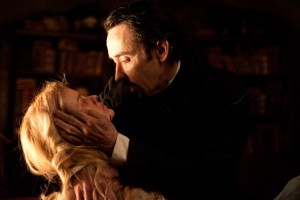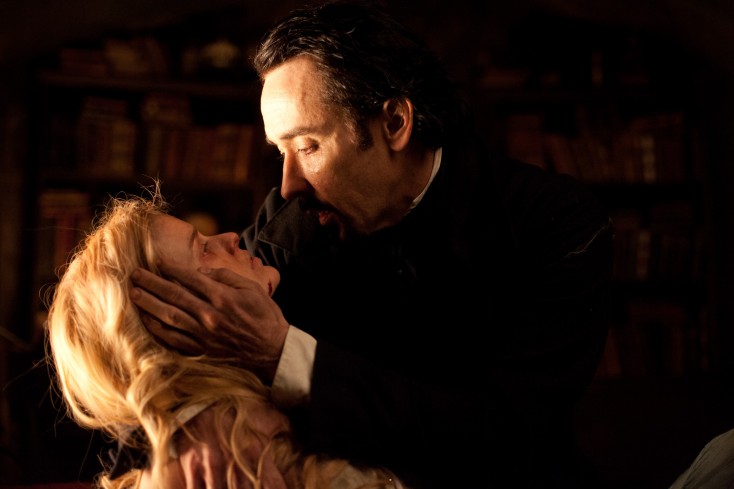
(Left to right.) Alice Eve and John Cusack star in Relativity Media's stylish gothic thriller "The Raven." ©Relativiity Media. (Click on photo for hi-res version).
By ANGELA DAWSON
Front Row Features
HOLLYWOOD—John Cusack admits he got a little obsessed portraying the original king of the macabre, Edgar Allan Poe. He read nearly every work of the 19th century American writer and scoured books about him and his bizarre and tragic life.
Cusack, 45, plays a fictionalized version of Poe in “The Raven,” in which the brilliant but underappreciated genius joins forces with a Baltimore police detective (Luke Evans) to solve a series of murders that appear to be inspired by the writer’s works. When Poe’s love, Emily (Alice Eve), becomes the serial killer’s next target, the stakes are raised even higher and Poe must call upon his own powers of deduction to try and solve the mystery before it’s too late.
The dark thriller, a cross between 2001’s Jack the Ripper inspired “From Hell” and the stylish, Robert Downey Jr. starrer “Sherlock Holmes,” is directed by James McTeigue (“V for Vendetta”), from a script by Hannah Shakespeare and Ben Livingston.
Cusack recently sat down to discuss getting into the mind of the brilliant writer and what playing Poe means to him.
Front Row Features: How did you prepare to get in the mode of Poe?
John Cusack: The script was terrific, James (McTeigue) and I went through it with the writers and tried to pull as much of Poe’s own dialogue as we could from his letters and novels. We put that cadence and idiom into the kind of structure of this genre story, which is basically a Poe story where Poe becomes a character in one of his own tales, so you have Poe deconstructing Poe. I was always trying to use (Poe’s) own vernacular and words as much as I could in this fictional setting. There’ are volumes of his own thoughts on his writings. He wasn’t shy about his product.
Front Row Features: What was the appeal of taking this role?
Cusack: As an actor playing Poe, and trying to get under the skin of this very complex genius, I thought it would be a great challenge and a great opportunity. I was up for it 100 percent.
Front Row Features: What did you take away from playing Poe?
Cusack: He had feelings of abandonment and loneliness from losing his mother, his stepmother and then his wife (at a young age). He felt he was sort of this orphan of the world. He was a genius, and he was kind of a bastard, and he was a rogue, and he was all of the things that you would think of him. He’s become sort of a shadow archetype of the culture. He was a pioneer into the underworld. I just thought if I could immerse myself in that, if I can feel that, it would be a great challenge.
Front Row Features: What did you do to release the darkness of this character from you at the end of each day?
Cusack: I don’t know. We were (filming) in Hungary and in Serbia and it was winter. So, it sort of felt like we were as far away from the world as we could be. We were on these cobblestone streets, and we were shooting a lot at night. So I just sort of felt like I became a vampire, and I’d sort of cling to Alice (Eve), I don’t know if I was disagreeable, but I might have been. It felt like a bender, but in a good way, a kind of cool bender.
Front Row Features: Did that dark mood linger?
Cusack: When I finished, we were at the airport in London, and I think James looked at me and said, “You ought to go home, man.” I went back home and I did scare my family. I was pretty strung out.
Front Row Features: Were you a little scared about allowing yourself to go to that dark space?
Cusack: Yeah, but it was the kind of thing where you just have to go all in. It seemed like the only way to go. Poe was a guy who took all of his suffering and all of his faults, but he was genuinely interested in going into the underworld and exploring these areas that most people are afraid to explore. There’s something courageous about that. He was always looking for that space between life and death. He was always looking for that other world. I think for him death and beauty were always intertwined. That’s why he’s the godfather of Goth.
Front Row Features: What else did you discover about him in your research into the character?
Cusack: He was a rogue and he was a gambler. He also went to West Point. He was a drunk, and he wanted to fight every man who was any competition to him. He was disagreeable and he was shy, but I don’t think he was a playboy. I think he was a one-women man, and I think that’s where he put his spiritual fervor. Every woman he ever loved died of tuberculosis in his arms. He called consumption “the family disease.”
Front Row Features: Do you relate to him?
Cusack: The way I relate to him is in that metaphysical space of his—the dream within the dream element, where waking ends and dreams begin. The spaces between life and death that he writes about are the most interesting to me, but he was also such a genius that a lot of his writing was burlesque and satirical. He was making satires of other people’s forms and styles, and he was not only a highly esoteric poet, but he was writing pulp and he was writing thrillers. I think he would have looked at “Saw” and said, “Yep, that was mine.”
Front Row Features: It’s only by luck that he wasn’t forgotten after he died.
Cusack: The French actually were the ones (who preserved his memory). Baudelaire thought he was some kind of aristocrat (living) in a southern manor house when he died. Actually, (Poe) died in a hovel. The French brought him back into prominence, but he was pretty much lost in America.
Front Row Features: Was it difficult to get a film like this made?
Cusack: James had enough clout as a filmmaker and the numbers worked where we felt like we went to Serbia together and it was ours to win or lose. We didn’t feel like anyone else was screwing with it. I can at least say we went there. We were all in on the concept.
Front Row Features: What Poe work inspires you most?
Cusack: I like his more absurdist stuff, “King Pest” or “Hop-Frog.” You also have the great classic allegories, “The Fall of the House of Usher” and “The Masque of the Red Death.”
Front Row Features: Why did you insist and feel like it was important to wear black for your character Poe?
Cusack: That’s how he dressed. I sort of figured you go Goth or go home.
Front Row Features: Were any of the scenes particularly memorable to you?
Cusack: Poe used to do this thing where he would like go to salons, and he would put the lights down low and he would give these very supernaturally intense readings of “The Raven.” But James decided he would set it up where Poe had to do it for the money to buy food, like a day job, and the set was brightly lit. We did have me in purple in that scene. I thought it was pretty funny.
Front Row Features: Do you see similarities between Poe and more contemporary writers?
Cusack: Yes. He’s Hunter S. Thompson-esque. You can see Hunter’s voice and you can see all the first-person narratives people put themselves into with their own journalistic and interpretations. From (Norman) Mailer to (Truman) Capote to Tom Wolfe to Hunter, you can see their origins in Poe.
Front Row Features: Did anything surprise you about working with Alice Eve?
Cusack: No. When I met her and saw her I sort of assumed she would be as good as she was. You just always hope you have a certain kind of chemistry. With Alice, it was easy and effortless.




